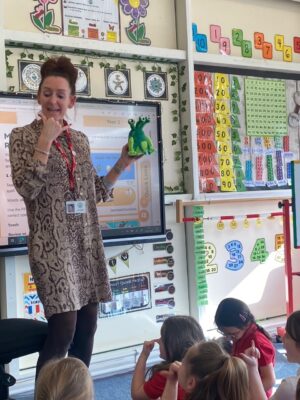A year-long action research project has made waves in Wales, celebrating the dedication and impressive progress of ten primary schools across the country. This innovative project, led by education expert Mike Glavin at Catalyst, examined the impact of a DfE validated Systematic Synthetic Phonics (SSP) programme on early literacy outcomes, with a particular focus on Reception, Year 1, and Year 2 pupils. The results from these schools are nothing short of inspiring, highlighting the power of evidence-based teaching methods in transforming children’s reading abilities.
The project used Monster Phonics, a Department for Education (DfE)-validated scheme, which provided an engaging and practical framework for teaching phonics. This programme’s success can be attributed to its unique approach, which includes colour-coding difficult sounds and offering memorable cues to help children internalise the grapheme-phoneme correspondence.
The participating schools demonstrated remarkable progress, especially in Reception classes, where young learners showed exceptional gains in their reading abilities. This achievement is particularly notable as many of these children started the project with limited foundational literacy skills.
Rhian Rogers, Monster Phonics Literacy Lead for Wales, praised the schools for their hard work, saying, “The dedication and professionalism shown by these schools have been instrumental in driving standards up. They can be proud of their hard work and commitment to enhancing children’s reading skills.”
Indeed, the results are a testament to the teachers’ unwavering commitment to improving literacy outcomes for all children, despite the challenges posed by outdated methods still used in some schools.
The positive results from this pilot come at a crucial time, as recent media coverage highlights the urgent need for clarity and guidance from the Welsh Government regarding the use of phonics in classrooms.
In an ITV News investigation titled ‘Inside the Reading Crisis: Leaving Thousands of Children in Wales Unable to Read’, Wales reporter Rhys Williams drew attention to the growing concerns about literacy levels in Wales. Williams reported that a significant number of schools in the country are still relying on outdated and ineffective teaching methods that risk leaving children “functionally illiterate.”
The success of the Monster Phonics programme and the tangible improvements in the schools involved demonstrate the importance of a structured, evidence-based approach to phonics instruction. This outcome strongly aligns with calls from educators across Wales for stronger, clearer guidance from the Welsh Government to ensure that all Welsh schools are adopting modern, research-backed phonics methods.

By focusing on Systematic Synthetic Phonics (SSP), schools can address the root causes of literacy challenges in Wales, providing children with the tools they need to become confident readers. This action research project showcases the positive impact that such a focused, well-supported phonics programme can have on early education.
Mike Glavin, project leader, remarked: “It has been an absolute privilege to witness first-hand the journey of these ten schools as they recognised that phonic standards needed to improve. They embraced change, challenged mindsets, and achieved huge success for their learners. Their willingness to share their journey is invaluable to schools in Wales and provides a challenge to all those that consider the existing poor practice in the teaching of phonics to be acceptable. It’s not. Children in Wales deserve better!”
The success of these schools serves as a powerful reminder that standards can and must improve. With the right training, resources, and commitment, schools across Wales can provide children with the reading skills they need to succeed.


As these primary schools continue to set a high bar for phonics education, there is a growing sense of urgency for the education minister for Wales, Lynne Neagle, to provide a clear, unified strategy for phonics instruction across the country. The results from the Monster Phonics action research project stand as a compelling example of what is possible when evidence-based, structured phonics teaching is embraced wholeheartedly.
With schools like these paving the way forward, the hope is that all Welsh schools will soon follow suit, adopting high-quality, effective phonics programmes that put children’s literacy development at the forefront.
For now, the teachers, schools, and pupils involved in this project can proudly reflect on the outstanding progress made—and look forward to seeing the positive impacts ripple across Wales, changing the reading futures of thousands of children for the better.